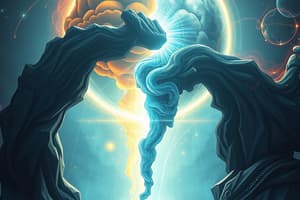Podcast
Questions and Answers
How does Descartes explain the possibility of error?
How does Descartes explain the possibility of error?
The possibility of error comes from our misuse of free will which is beyond our understanding.
What is the problem of circularity that arises for Descartes?
What is the problem of circularity that arises for Descartes?
He uses the existence of God to prove clear and distinct ideas but uses clear and distinct ideas to prove the existence of God.
How many kinds of substance exist, according to Descartes?
How many kinds of substance exist, according to Descartes?
2 kinds of substances: mind whose essence is thought and body whose essence is extension.
What is Leibniz's theory of truth?
What is Leibniz's theory of truth?
What is Leibniz’s version of the principle of sufficient reason?
What is Leibniz’s version of the principle of sufficient reason?
What is the principle of the identity of indiscernibles?
What is the principle of the identity of indiscernibles?
According to Leibniz, what are space and time?
According to Leibniz, what are space and time?
What is Leibniz’s doctrine of pre-established harmony?
What is Leibniz’s doctrine of pre-established harmony?
What two doctrines are characteristic of rationalism?
What two doctrines are characteristic of rationalism?
What two doctrines are characteristic of Empiricism?
What two doctrines are characteristic of Empiricism?
What is an idea, according to Locke?
What is an idea, according to Locke?
How do we acquire abstract ideas, according to Locke?
How do we acquire abstract ideas, according to Locke?
According to Locke, what is our idea of 'substance in general'?
According to Locke, what is our idea of 'substance in general'?
According to Locke, what is a person and what constitutes personal identity through time?
According to Locke, what is a person and what constitutes personal identity through time?
What is liberty (freedom), according to Locke?
What is liberty (freedom), according to Locke?
In what way are direct realism and indirect realism similar, and in what way are they different?
In what way are direct realism and indirect realism similar, and in what way are they different?
Flashcards are hidden until you start studying
Study Notes
Descartes on Error and God
- Descartes believes God is not a deceiver, but acknowledges the possibility of error.
- He explains this by attributing error to the misuse of free will, which is beyond our understanding.
Descartes' Problem of Circularity
- Descartes faces a circularity issue in his arguments.
- He uses God's existence to justify the validity of clear and distinct ideas.
- In turn, he utilizes clear and distinct ideas to prove God's existence, creating a circular dependency.
Descartes' Substance Dualism
- Descartes proposes two fundamental types of substance: mind and body.
- The essence of mind is thought, while the essence of body is extension (occupying space).
Leibniz's Theory of Truth
- Leibniz states that in every affirmative truth, the concept of the predicate is contained within the concept of the subject.
- This means the truth of a statement lies in the inclusion of the predicate's concept within the subject's concept.
Leibniz's Principle of Sufficient Reason
- Leibniz asserts that everything has a reason, an immediate consequence of his theory of truth.
- This principle suggests there's an underlying cause or explanation for every event or existence.
Leibniz's Principle of the Identity of Indiscernibles
- No two distinct things can possess precisely the same properties.
- If two things have identical properties, they are actually one and the same.
Leibniz's View on Space and Time
- Leibniz believes space and time are not objective entities but rather relations between objects.
- They exist solely as ideal concepts, not independent realities.
Leibniz's Doctrine of Pre-established Harmony
- All things act according to their own intrinsic principles, independent of external influence.
- This signifies a harmonious predetermined order in the universe, where everything operates according to its nature.
Characteristics of Rationalism
- Knowledge can be acquired through reason alone, independent of sensory experience.
- Certain truths are known a priori, meaning they are grasped without prior experience, through pure reason.
Characteristics of Empiricism
- All ideas originate from sensory experience, making experience the foundation of knowledge.
- Empiricism rejects the notion of innate ideas, arguing that all knowledge is derived from the senses.
Locke's Definition of an Idea
- An idea is the object of thinking, a representation of sensory experiences.
- It is how we perceive and grasp things in our minds.
Locke's Acquisition of Abstract Ideas
- We acquire abstract ideas through the process of perception and extraction.
- Through sensory experiences, we abstract out common features, creating general concepts.
Locke's Idea of "Substance in General"
- For Locke, every individual object possesses a substratum, a "substance" that underlies and supports its perceivable qualities.
- This substratum is unknown and unobservable, only serving as a support for perceived properties.
Locke's Concept of Person and Personal Identity
- A person is a thinking being capable of self-reflection and consciousness.
- Personal identity over time is established by the continuity of consciousness, the ability to remember past actions and experiences.
Locke's Understanding of Liberty (Freedom)
- Liberty is the capacity to act according to one's will without external constraints.
- It is the power to choose and execute actions based on personal desires and intentions, free from external limitations.
Similarities and Differences between Direct Realism and Indirect Realism
- Both direct realism and indirect realism assert that we perceive the external world.
- Direct realism claims we perceive it directly, while indirect realism posits that we perceive it through mental representations (ideas).
Studying That Suits You
Use AI to generate personalized quizzes and flashcards to suit your learning preferences.




